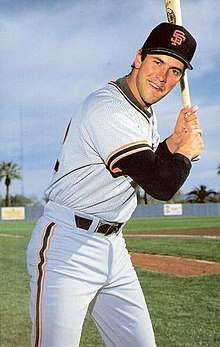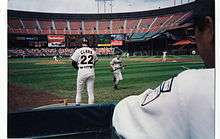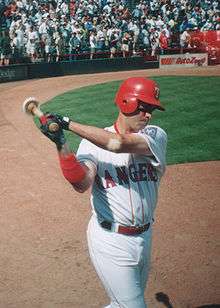Will Clark
William Nuschler Clark Jr. (born March 13, 1964) is an American professional baseball first baseman who played in Major League Baseball (MLB) from 1986 through 2000. He played for the San Francisco Giants, Texas Rangers, Baltimore Orioles, and St. Louis Cardinals. Clark was known by the nickname of "Will the Thrill." The nickname has often been truncated to simply, "The Thrill."[1]
| Will Clark | |||
|---|---|---|---|
 | |||
| First baseman | |||
| Born: March 13, 1964 New Orleans, Louisiana | |||
| |||
| MLB debut | |||
| April 8, 1986, for the San Francisco Giants | |||
| Last MLB appearance | |||
| October 1, 2000, for the St. Louis Cardinals | |||
| MLB statistics | |||
| Batting average | .303 | ||
| Hits | 2,176 | ||
| Home runs | 284 | ||
| Runs batted in | 1,205 | ||
| Teams | |||
| Career highlights and awards | |||
| |||
| Medal record | ||
|---|---|---|
| Men's Baseball | ||
| Representing | ||
| Olympic Games | ||
| 1984 Los Angeles | Team | |
Clark played college baseball for the Mississippi State Bulldogs, where he won the Golden Spikes Award, and at the 1984 Summer Olympics before playing in the major leagues. Clark was a six-time MLB All-Star, a two-time Silver Slugger Award winner, a Gold Glove Award winner, and the winner of the National League Championship Series Most Valuable Player Award in 1989.
Clark has been inducted into the National College Baseball Hall of Fame, Mississippi Sports Hall of Fame, Louisiana Sports Hall of Fame, and Bay Area Sports Hall of Fame. He will have his uniform number retired by the Giants during the 2020 season.
Amateur career
Clark graduated Jesuit High School in New Orleans, Louisiana.[2] He grew up a Kansas City Royals fan and was drafted by the Royals in the 4th round of the 1982 draft but chose not to sign.[2][3] He attended Mississippi State University to play college baseball for the Mississippi State Bulldogs. In 1983, he played collegiate summer baseball for the Cotuit Kettleers of the Cape Cod Baseball League (CCBL). A league all-star, he batted .367 and was inducted into the CCBL Hall of Fame in 2004.[4]
Clark played for the United States national baseball team at the 1984 Summer Olympics. During the five-game Olympic tournament, Clark led the team in batting average (.429), hits (9), runs batted in (8) and tied for the team lead in home runs (3).
In 1985, The Sporting News named Clark an All-American and he later won the Golden Spikes Award from USA Baseball as the best amateur baseball player in the country. A teammate of Rafael Palmeiro, the two were known as "Thunder and Lightning."[5] Clark and Palmeiro were known to dislike each other, dating back to their time at Mississippi State.[6]
Professional career
San Francisco Giants (1986–1993)
Clark was drafted with the second overall pick in the 1985 Major League Baseball draft by the San Francisco Giants.[7] In his first major league at-bat on April 8, 1986, Clark hit a home run—off future Hall of Fame member Nolan Ryan.[7] A few days later, Clark also homered in his first home game at Candlestick Park (he debuted at age 22, wearing the number 22, playing first base). An elbow injury cost Clark 47 games in his rookie season.[7] Clark finished his rookie year with a .287 batting average.

In his first full season in 1987, Clark had a .308 batting average. Clark was voted the starting first baseman for the NL All-Star team every season from 1988 through 1992. In 1988, Clark was the first Giants' player to drive in 90 or more runs in consecutive seasons since Bobby Murcer from 1975-1976.
In 1989, Clark batted .333 (losing the batting title to Tony Gwynn on the final day of the season) with 111 runs batted in (RBIs). Clark finished second in the NL Most Valuable Player voting to Giants teammate Kevin Mitchell.
In 1989, Clark and the Giants defeated the Chicago Cubs in the National League Championship Series (NLCS). In Game 1, Clark had already hit a solo home run. Prior to a subsequent at-bat, Cubs' catcher Rick Wrona went to the mound to discuss with Greg Maddux how to pitch to Clark. From the on-deck circle, Clark watched the conversation and read Greg Maddux's lips saying "fastball high, inside." The first pitch was a fastball high and inside which Clark sent into the street beyond right field for a grand slam. Afterwards, pitchers began to cover their mouths with their gloves when having conversations on the pitcher's mound.[8] (The Chicago Tribune's front page the next day paid tribute to his performance with a headline of "Clark's night on Addison.")[9]
In Game 5 of the series, Clark faced Cubs closer Mitch Williams with the score 1-1 in the bottom of the eighth inning. Clark singled to center field to drive in two runs, breaking the tie, eventually sending the Giants to the World Series. Clark's efforts, which included a .650 batting average and two home runs, resulted in him being named NLCS MVP. The Giants went on to face the Oakland Athletics in the 1989 World Series, but were swept. In the only World Series appearance of his career, Clark failed to contribute significantly at the plate, finishing with no runs batted in and a .250 batting average while battling tonsillitis.[10]
Clark had become a very durable player since his rookie year injury, setting a San Francisco record with 320 consecutive games played from September 1987 through August 1989.[7] However, a string of injuries reduced his playing time in the early 1990s and diminished his production. Clark drove in just 73 runs in 1992, the lowest total since his rookie year.[11]
Clark's contract with the Giants expired after the 1993 season.

Texas Rangers (1994–1998)
The Texas Rangers signed Clark to replace his former Mississippi State teammate, Rafael Palmeiro, at first base. Clark made the American League All-Star team in 1994[11] and finished the season with a .329 batting average, the second-highest of his career. He maintained a high level of offensive production throughout his tenure with Texas, finishing below .300 only in 1996. Injuries limited his playing time to 123, 117 and 110 games from 1995 through 1997, but Clark led the Rangers to American League West Division titles in 1996 and 1998. Clark struggled offensively in both the 1996 and 1998 postseasons, though he put together his most productive regular season in seven years in 1998 (.305, 23 HRs, 41 2Bs, 102 RBIs). Following the 1998 season, the Rangers re-signed Rafael Palmeiro, effectively ending Clark's days with the team.
Baltimore Orioles and St. Louis Cardinals (1999–2000)
Clark signed a two-year deal with the Orioles before the 1999 season, again replacing Palmeiro, who had left Baltimore to return to Texas. Clark spent nearly two years with Baltimore but was plagued by injuries. On June 15, Clark got his 2000th hit versus the Kansas City Royals.
At the MLB trade deadline in 2000, the Orioles traded Clark to the St. Louis Cardinals for José León. He was acquired in part to play in place of the injured Mark McGwire.[12] Clark batted .345 while hitting 12 home runs and driving in 42 runs in 51 games. Clark helped the Cardinals defeat the Atlanta Braves in the NLDS with 4 runs batted in during the series. In the NLCS, the Cardinals faced the New York Mets. Clark batted .412 in the series but the Mets won the series and the National League pennant. Despite being revitalized during his time with the Cardinals, he decided to retire at the end of the season. Clark batted .319 during his final season and went 1 for 3 in his final game on October 16, 2000.
Legacy
Clark was inducted into the College Baseball Hall of Fame in 2006. He was inducted into the Louisiana Sports Hall of Fame in June 2004[2], the Bay Area Sports Hall of Fame on April 26, 2007[13][14] and the Mississippi Sports Hall of Fame on August 1, 2008.[15].
Clark has final statistics of 284 home runs, 1,205 RBI, a .303 batting average, and a .881 OPS. In 2006 Hall of Fame balloting, Clark received 23 votes, 4.4% of the total, which withdrew him from consideration from future ballots, as he did not receive the required 5% threshold to stay on.[16]
It was announced on August 11, 2019 that the Giants would retire Clark's #22 during the 2020 season.[17]
Honors
- USA Baseball Golden Spikes Award (1985)
- National League All-Star 1988, 1989, 1990, 1991, 1992[11]
- American League All-Star 1994[11]
- MVP of the 1989 National League Championship Series
- Two-time National League Silver Slugger Award at First base (1989 and 1991).
- 1991 National League Gold Glove Award at First Base.
- On July 4, 2006, Clark was inducted into the College Baseball Hall of Fame in its inaugural class.
- Inducted into the Louisiana Sports Hall of Fame in 2004.
- Inducted into the Bay Area Sports Hall of Fame in 2007.
- Inducted into the Mississippi Sports Hall of Fame in 2008.
See also
- Baltimore Orioles all-time roster
- List of Major League Baseball annual runs batted in leaders
- List of Major League Baseball annual runs scored leaders
- List of Major League Baseball career hits leaders
- List of Major League Baseball career home run leaders
- List of Major League Baseball career OPS leaders
- List of Major League Baseball career runs batted in leaders
- List of Major League Baseball career runs scored leaders
- List of Major League Baseball players with a home run in their first major league at bat
- Major League Baseball Player of the Month Award
- Major League Baseball Player of the Week Award
- San Francisco Giants all-time roster
- St. Louis Cardinals all-time roster
- Texas Rangers all-time roster
References
- BaseballEvolution.com Hall of Fame
- https://sabr.org/bioproj/person/3bcff907
- https://www.baseball-reference.com/players/c/clarkwi02.shtml/
- "Ten Legends to be Inducted into Cape Cod Baseball League Hall of Fame". capecodbaseball.org. Retrieved August 11, 2019.
- http://maroonandwhitenation.com/2015/04/29/sec-storied-thunder-lightning-to-premiere-monday/ SEC Storied: Thunder & Lightning to Premiere Monday
- Chass, Murray (9 March 1994). "Baseball; Thoughts Deep in the Heart of Texas". New York Times. Retrieved 8 October 2014.
- The Ballplayers – Will Clark | BaseballLibrary.com Archived 2007-09-10 at the Wayback Machine
- Stark, Jayson. "Talk to the glove!", ESPN (Aug 22, 2013).
- Chicago Tribune, October 5, 1989, page A1
- "Raspy, Feverish, Will Clark Skips Batting Practice". Los Angeles Times. October 16, 1989.
- Will Clark Statistics Baseball-Reference.com
- https://www.espn.com/mlb/news/2000/0731/661735.html
- "Hall of Fame Inductees (2007)". Bay Area Sports Hall of Fame.
- FitzGerald, Tom (27 April 2007). "New inductees remember / Rice, ex-Giant Clark among those recalling their finest hours". San Francisco Chronicle.
- "News – MS Sports Hall of Fame and Museum". Archived from the original on February 25, 2012. Retrieved 2010-04-01.CS1 maint: BOT: original-url status unknown (link)
- Will Clark Statistics – The Baseball Cube
- "Giants to retire Will Clark's No. 22 next year". ESPN.com. 2019-08-12. Retrieved 2019-08-12.
External links
- Career statistics and player information from MLB, or ESPN, or Baseball-Reference, or Fangraphs, or Baseball-Reference (Minors), or Retrosheet
- Will Clark at SABR (Baseball BioProject)